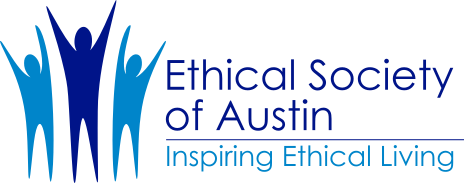What is the Ethical Society of Austin?
The Eight Commitments of Ethical Culture
The Eight Commitments of Ethical Culture were written in collaboration with Leaders and members of the American Ethical Union, coordinated by Lois Kathleen Kellerman, Leader Emeritus of the Brooklyn Society for Ethical Culture.
1. Ethics is central.
The most central issue in our lives involves creating a more humane environment.
2. Ethics begins with choice.
Creating a more humane environment begins by affirming the need to make significant choices in our lives.
3. We choose to treat each other as ends, not merely means.
To enable us to be whole, in a fragmented world, we choose to treat each other as unique individuals having intrinsic worth.
4. We seek to act with integrity.
Treating one another as ends requires that we learn to act with integrity. This includes keeping commitments, and being more open, honest, caring, and responsive.
5. We are committed to educate ourselves.
Personal progress is possible, both in wisdom and in social life. Learning how to build ethical relationships and cultivate a humane community is a life-long endeavor.
6. Self-reflection and our social nature require us to shape a more humane world.
Spiritual life is rooted in self-reflection, but can only come to full flower in community. This is because people are social, needing both primary relationships and larger supportive groups to become fully human. Our social nature requires that we reach beyond ourselves to decrease suffering and increase creativity in the world.
7. Democratic process is essential to our task.
The democratic process is essential to a humane social order because it respects the worth of persons and elicits and allows a greater expression of human capacities. Democratic process also implies a commitment to shared responsibility and authority.
8. Life itself inspires religious response.
Although awareness of impending death intensifies the human quest for meaning, and lends perspective to all our achievements, the mystery of life itself, the need to belong, to feel connected to the universe, and the desire for celebration and joy, are primary factors motivating human “religious” response.
We are a community of believers and non-believers
The Ethical Culture movement was started over 140 years ago by Dr. Felix Adler. Ethical Culture came to Austin in 1994, when the Ethical Culture Fellowship of Austin was founded. The name was changed to Ethical Society of Austin (ESOA) in 1999. ESOA is a welcoming humanist community. Members strive to live ethical lives and bring out the best in others, thereby bringing out the best in themselves. At Sunday meetings, members share ethical dilemmas, joys, concerns, and explore a variety of topics from the personal to the international. In addition to Sunday meetings, members come together in community to share a potluck lunch monthly, to carry out ethical actions as part of the greater Austin community as called, and to support each other personally as needed.
Our Community
Ethical Society of Austin 2023 - 2024 Board of Trustees Roster
Rebecca Fisher - President
Trish Taylor - Vice President
Lynn Gilbert - Treasurer
Lee Follender - Secretary
Lisa Harris - Trustee
Terry Ellis - Trustee
To contact the Trustees, please email info@ethicalaustin.org
ESOA Supports and Works with the Following Organizations:
Interfaith Action of Central Texas
Austin Humanists at Work
Center for Inquiry Austin
5604 Manor Community Garden



